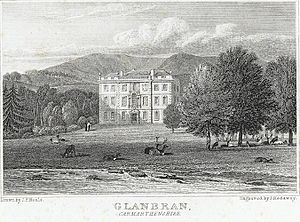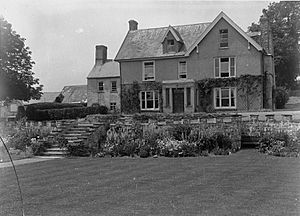Marmaduke Gwynne facts for kids
Marmaduke Gwynne (born 1691, died 1769) was an important person in the early days of Methodism. He came from a wealthy family in Wales. Marmaduke became a follower of Methodism, a new Christian movement, and helped it grow. He offered legal advice and money to the Methodists. His daughter, Sarah, even married Charles Wesley, who was one of the founders of Methodism.
Marmaduke Gwynne's Early Life
Marmaduke Gwynne was born in a place called Llanafan Fawr in Breconshire, Wales. His parents were Howell and Mary Gwynne. He was born on January 1, 1692. Marmaduke was the oldest of seven children. He was named after his grandfather, who had made the family's money. His grandfather had faced some problems with his job as a judge.
Marmaduke went to Jesus College, Oxford for his education. After that, he studied law at Gray's Inn in London in 1711. He seemed to get his interest in law from his grandfather. His interest in religion came from his father and another family member, Sackville Gwynne.
When Marmaduke became an adult, he inherited a lot of land and money from his grandfather. This included properties called Garth and Llanelwedd. In 1718, he married Sarah Evans from Peterwell. Sarah also came from a rich family, bringing a large sum of money and her own income to the marriage. Marmaduke became a local judge and the High Sheriff of Radnorshire in 1718.
In 1726, Marmaduke's fifth child, Sarah, was born. He became good friends with a clergyman named Theophilus Evans. From 1727, Mr. Evans worked as a private chaplain at the Gwynne family home in Garth. He would often preach there, sometimes more than once a day.
Becoming a Methodist
Marmaduke Gwynne became a Methodist in 1737. He started to actively support a preacher named Howell Harris. The story goes that Marmaduke first went to listen to Harris because he was a judge and wanted to investigate him. He brought a copy of the Riot Act, which was used to break up public gatherings. But first, he decided to listen to one of Harris's sermons.
Marmaduke was immediately convinced by Harris's words. He invited Harris to his house for dinner that very evening. When Marmaduke returned home, his wife refused to eat with the stranger. Their eleven-year-old daughter, Sally (Sarah), was curious. However, Theophilus Evans, their chaplain, was not impressed. He left the Gwynne household within two years.
In 1738, Marmaduke offered Howell Harris valuable Welsh books. He was one of the first wealthy people in Wales to openly support this new religious movement. At home, only his daughter Sally shared his strong religious beliefs.
In January 1741, Howell Harris was arrested. People claimed that he and his followers had caused trouble at a celebration. When the case went to court, Harris did not want a lawyer. This meant Marmaduke Gwynne had to speak for him. After the court hearing, an angry crowd tried to attack Harris. Marmaduke and his brother, Roderick Gwynne, managed to stop the attack. Marmaduke used his legal skills to help Harris avoid jail time. Harris only had to pay a fine for a lesser charge of "behaving in a disorderly way."
Marmaduke spent more and more time on his religious beliefs. He continued to write letters to Howell Harris. Even though his wife didn't always agree, he welcomed many travelers with similar beliefs into his home. These guests included famous preachers like George Whitefield and John and Charles Wesley. The Gwynne family had many servants who looked after them and their guests.
In 1745, Marmaduke attended a Methodist conference in Bristol. He was the only person there who was not a preacher. On April 8, 1749, his daughter, Sarah, married Charles Wesley. They were married at Llanllywenfel parish church near Garth, Powys. Sarah and Charles had met two years earlier. People said it was "love at first sight" and a very happy marriage for the Wesley family. Sarah's mother gave her a large sum of money and income for the marriage.
Marmaduke's strong support for the Wesleys made his relationship with Howell Harris less close. Eventually, Marmaduke became less involved in actively supporting Methodism. However, he remained good friends with the Wesleys and Howell Harris. Marmaduke Gwynne lived in Ludlow for several years after 1745. He then returned to Breconshire.
Marmaduke Gwynne passed away in 1769, at the age of 77. He was buried at Llanlleonfel parish church, close to his Garth estate. He had six daughters and three sons named Howell, Roderick, and Marmaduke. Over time, the children of his second son, also named Marmaduke, inherited the family's wealth. They lived at Llanelwedd Hall until the early 1900s.
 | William Lucy |
 | Charles Hayes |
 | Cleveland Robinson |



